小学六年级英语-四大时态总复习及练习
小学四大时态练习(打印版)
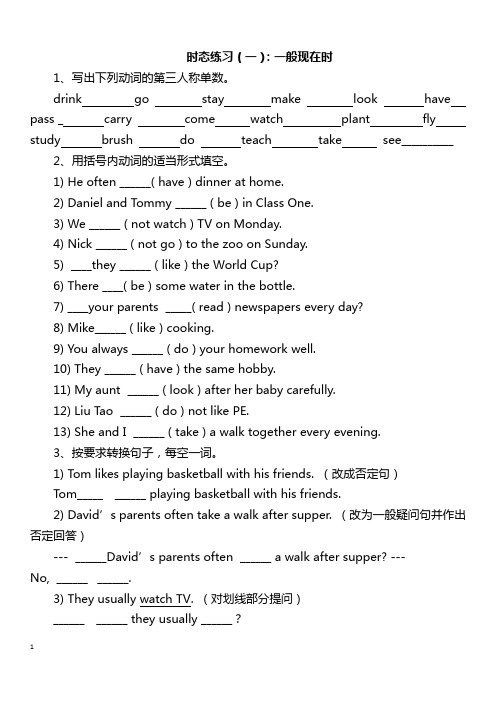
时态练习(一):一般现在时1、写出下列动词的第三人称单数。
drink go stay make look have pass _ carry come watch plant fly study brush do teach take see__________2、用括号内动词的适当形式填空。
1) He often ______( have ) dinner at home.2) Daniel and Tommy ______ ( be ) in Class One.3) We ______ ( not watch ) TV on Monday.4) Nick ______ ( not go ) to the zoo on Sunday.5) ____they ______ ( like ) the World Cup?6) There ____( be ) some water in the bottle.7) ____your parents _____( read ) newspapers every day?8) Mike______ ( like ) cooking.9) You always ______ ( do ) your homework well.10) They ______ ( have ) the same hobby.11) My aunt ______ ( look ) after her baby carefully.12) Liu Tao ______ ( do ) not like PE.13) She and I ______ ( take ) a walk together every evening.3、按要求转换句子,每空一词。
1) Tom likes playing basketball with his friends. (改成否定句)Tom_____ ______ playing basketball with his friends.2) David’s parents often take a walk after supper. (改为一般疑问句并作出否定回答)--- ______David’s parents often ______ a walk after supper? ---No, ______ ______.3) They usually watch TV. (对划线部分提问)______ ______ they usually ______?4)She is always a good student. (改为一般疑问句并作出肯定回答)5)--- ___ ______ always a ______ student? --- ______ , ______ ______ .6)5) Simon and Daniel like going skating. (改为否定句)7)Simon and Daniel ______ ______ going ______.6)Tom does his homework every day.(否定句)Tom_________ ______ his homework every day.7)Alice has got a new comic book as her birthday present.(改为一般疑问句并肯定回答)_________ Alice___________ a new comic book as her birthday presentYes, _______ _________.时态练习(二):一般将来时一、用所给动词的正确形式填空。
新标准英语六年级下册四种时态时间标志记忆口诀与练习

新标准英语六年级下册四种时态时间标志记忆口诀1.一般现在时:‚总经常有每没(美眉^^)复星周‛总:always(总是), usually(通常)等经常:often(常常)有:sometimes (记住,‚有‛不是have,而是‚有时‛)每:every week/month/year 等(每一个……)没:never(从不)复星周:on Mondays(在每一个星期一)on Tuesdays(在每个周二)等2.一般过去时:‚昨天上个XX(读作叉叉)前,in加年份when字连‛昨天:yesterday,后面可以加morning, afternoon,evening等上个:last,后面可以加week, month,year等XX前:ago,前面可以加three weeks/months/years agoin加年份:in 2009/2008/1986/1220等when字连:when(当……的时候)I was a child等, when字后面都是过去时,与其相连的另一个句子也要用一般过去时。
例如:When I was a child,I could(can的过去式)ride a bike.可以说成:I could(can的过去式)ride a bike when I was a child.3.一般将来时:正好和一般过去时对应:‚明天下个XX后‛明天:tomorrow,后面可以加morning, afternoon,evening下个:next,后面可以加week,month,year等XX后:after和in,后面可以加three weeks/months/years这里要注意一下,after后加时间点才表示将来,如after 3 o‘clock 。
加时间段表示过去,如after 2 hours 表示过去。
in后加时间段表将来,如in two years。
4.现在进行时:‚现在时刻看和听,最近在哪请安静。
小升初四大时态总结复习与练习

③ago系列 一段时间+ago:…前 (几年/几个月/几天/几周)+ago (几小时/几分钟/几秒)+ago two years ago两年前 three months ago三个月前 four weeks ago四周前
five days ago五天前 an hour ago一小时前 five minutes ago五分钟前 two seconds ago两秒前
练习
try _t_r_ie_d______ be___w_a_s_/w__e_re_ do_____d_id____ have__h_a_d______
sleep__s_l_ep__t ____ see__s_a_w______ drink__d_r_a_n_k____ go___w_e_n_t____
一般将来时
1.概念:表示即将发生的动作,未来一段时间将要持续的一段状态或动作。 2.句型: ①主语 +be going to +动词原形. ②主语+will+动词原形+其他. 3.标志词:
①tomorrow系列(早午晚) tomorrow morning明天早上 tomorrow afternoon明天下午 tomorrow evening/night明天晚上 the day after tomorrow后天
make__m__a_k_es___
sing___si_n_g_s___
go__g_o_e_s____ wash__w_a_s_h_e_s__
fix__fi_xs______ watch__w__a_tc_h_e_s_
have___h_a_s____ study__s_tu_d__ie_s__
leave __l_ea_v_e_s___ visit __v_is_it_s____
六年级四种时态复习及练习优选稿

六年级四种时态复习及练习集团公司文件内部编码:(TTT-UUTT-MMYB-URTTY-ITTLTY-六上英语四种时态的比较一、概念比较一般过去时:表示过去发生过的事情或过去的状态。
一般现在时:表示现在经常发生的事情或现在的状态。
现在进行时:表示现在正在发生的事情。
一般将来时:表示即将发生的事情或将来的状态。
二、一般过去时:yesterday,thedaybeforeyesterday,lastSunday/week/month/year,twodaysago/aweek ago/threemonthsago/longlongago,justnow,thismorning/afternoon/evening,onSund ay/Saturday,in1998,onceuponatime等。
一般现在时:sometimes,usually,often,always,everyweek/year/Sunday,onSundays/Saturdays,inthemorning(s)/afternoon(s)/even ing(s),attheweekends,afterschool等。
现在进行时:now,look,listen,it’seighto’clock,she’sintheclassroom等。
一般将来时:tomorrow,thedayaftertomorrow,soon,nextyear/week/month,inafewdays,inthefutur e等。
三、句子结构比较一般过去时陈述句(肯定句):主语+was/were+其它。
eg.I was astudenttenyearsago.主语+动词过去式+其它。
eg.Shevisit ed Beijinglastyear.陈述句(否定句):主语+wasn’t/weren’t+其它。
eg.They weren’t atschoolyesterday.主语+助动词didn’t+动词原形+其它。
小学英语六年级所有时态综合练习
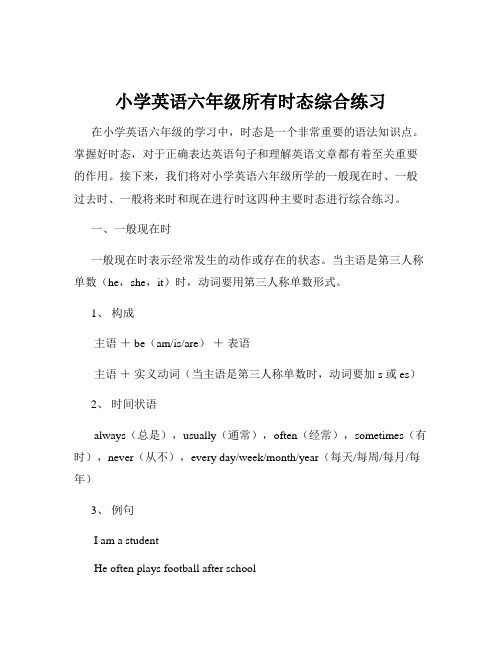
小学英语六年级所有时态综合练习在小学英语六年级的学习中,时态是一个非常重要的语法知识点。
掌握好时态,对于正确表达英语句子和理解英语文章都有着至关重要的作用。
接下来,我们将对小学英语六年级所学的一般现在时、一般过去时、一般将来时和现在进行时这四种主要时态进行综合练习。
一、一般现在时一般现在时表示经常发生的动作或存在的状态。
当主语是第三人称单数(he,she,it)时,动词要用第三人称单数形式。
1、构成主语+ be(am/is/are)+表语主语+实义动词(当主语是第三人称单数时,动词要加 s 或 es)2、时间状语always(总是),usually(通常),often(经常),sometimes(有时),never(从不),every day/week/month/year(每天/每周/每月/每年)3、例句I am a studentHe often plays football after schoolThey are very happy练习:1、 My father ______ (watch) TV every night2、 She ______ (like) music very much3、 The children often ______ (play) in the park二、一般过去时一般过去时表示过去发生的动作或存在的状态。
1、构成主语+ was/were +表语主语+动词的过去式2、时间状语yesterday(昨天),last week/month/year(上周/上个月/去年),ago(以前),in +过去的年份3、例句I was at home yesterdayThey played basketball last weekHe went to Beijing two years ago练习:1、 We ______ (have) a party last night2、 She ______ (buy) a new dress yesterday3、 He ______ (do) his homework an hour ago三、一般将来时一般将来时表示将来要发生的动作或存在的状态。
六年级英语总复习(时态-语法)
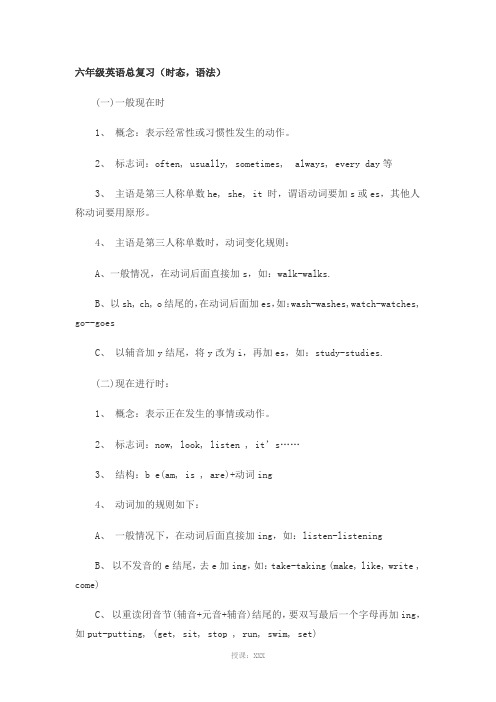
六年级英语总复习(时态,语法)(一)一般现在时1、概念:表示经常性或习惯性发生的动作。
2、标志词:often, usually, sometimes, always, every day等3、主语是第三人称单数he, she, it 时,谓语动词要加s或es,其他人称动词要用原形。
4、主语是第三人称单数时,动词变化规则:A、一般情况,在动词后面直接加s,如:walk-walks.B、以sh, ch, o结尾的,在动词后面加es,如:wash-washes,watch-watches, go--goesC、以辅音加y结尾,将y改为i,再加es,如:study-studies.(二)现在进行时:1、概念:表示正在发生的事情或动作。
2、标志词:now, look, listen , it’s……3、结构:b e(am, is , are)+动词ing4、动词加的规则如下:A、一般情况下,在动词后面直接加ing,如:listen-listeningB、以不发音的e结尾,去e加ing,如:take-taking (make, like, write , come)C、以重读闭音节(辅音+元音+辅音)结尾的,要双写最后一个字母再加ing,如put-putting, (get, sit, stop , run, swim, set)但:see-seeing, eat –eating.(三)一般将来时:1、概念:表示将要发生的事或打算,计划要做的事。
2、标志词:this weekend, next Monday, tomorrow, in seven years’ time3、结构:be(am, is , are) going to +动词原形或者 Will+动词原形如:I am going to take a trip next week.4、否定句:be+not going to +动词原形或者 Will+not(等于won’t)+动词原形(四)一般过去时:1、概念:表示在过去的时间里所发生的事或动作。
(完整word)六年级四种时态练习
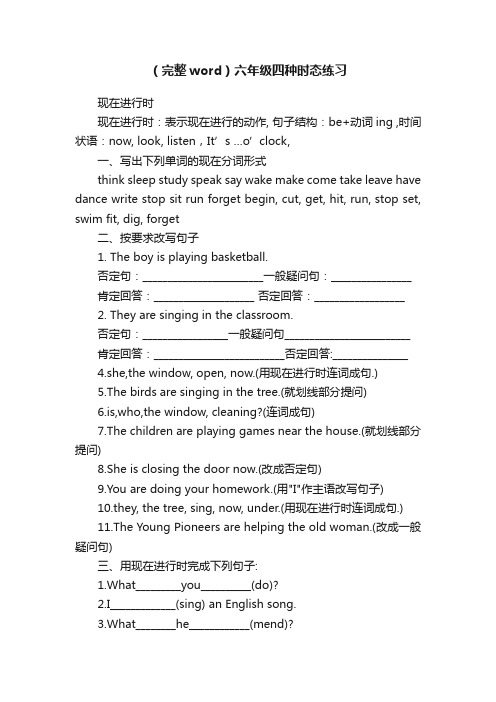
(完整word)六年级四种时态练习现在进行时现在进行时:表示现在进行的动作, 句子结构:be+动词ing ,时间状语:now, look, listen,It’s …o’clock,一、写出下列单词的现在分词形式think sleep study speak say wake make come take leave have dance write stop sit run forget begin, cut, get, hit, run, stop set, swim fit, dig, forget二、按要求改写句子1. The boy is playing basketball.否定句:________________________一般疑问句:________________ 肯定回答:____________________ 否定回答:__________________2. They are singing in the classroom.否定句:_________________一般疑问句_________________________ 肯定回答:__________________________否定回答:_______________4.she,the window, open, now.(用现在进行时连词成句.)5.The birds are singing in the tree.(就划线部分提问)6.is,who,the window, cleaning?(连词成句)7.The children are playing games near the house.(就划线部分提问)8.She is closing the door now.(改成否定句)9.You are doing your homework.(用"I"作主语改写句子)10.they, the tree, sing, now, under.(用现在进行时连词成句.)11.The Young Pioneers are helping the old woman.(改成一般疑问句)三、用现在进行时完成下列句子:1.What_________you__________(do)?2.I_____________(sing) an English song.3.What________he____________(mend)?4.He______________(mend) a car.5.______you__________(fly) a kite? Yes,_______.6.______she___________(sit) in the boat?7.______you_____________(ask) questions?8.We_______________(play) games now.9.Some girls ___________ ( sing)in the classroom .10. My mother ____________ ( cook )some nice food now. What __________ you _ __________ ( do ) now?11. Look . They ______________( have) an English lesson .12.They ______________(not ,water) the flowers now.13.Look! the girls ________________(dance )in the classroom .14.What is our granddaughter doing? She ________(listen ) to music.15. It’s five o’clock . We _______________(have)supper now16.___________Helen____________(wash )clothes? Yes ,she is .17. What are you _________(do) now? I _________(eat) bread.18. It’s nine o’clock. My father_________(work) in the office.19. Look, the boy____________(put) the rubbish into the bin.20. ____he______(cle an) the classroom? No, he isn’t. He_______(play)21. Where is Mak? He_________(run) on the grass.22. Listen, who_________(sing) in the music room?四、句型转换:1. They are doing housework .一般疑问句________________ 否定句____________________ ____2.The students are cleaning the classroom . 一般疑问句:_________3.I’m playing the football in the playground . (对划线部分进行提问)________________________________________________________ 4.Tom is reading books in his study .(对划线部分进行提问)_______________________________________18. Look, the bus ____________ (come).1. Look! The children________(swim) in the river.2. Now we________(want) to play basketball.3. -________you________(draw) a picture?-No, I'm not. I________(write) a letter.4. What are you _________(do) now? I ___________(eat) bread.5. It’s nine o’clock. My father_______________(work) in the office.6. Look, the boy____________(put) the rubbish into the bin.7. __________he__________(clean) the classroom? No, he isn’t.He____________(play).8. Where is Mak? He___________(run) on the grass.9. Listen, who____________(sing) in the music room? Oh,Mary_____________(sing) there.用正确的代词填空1. This is not _____ kite. It is very small, but _____ is very big. ( she )2. The dress is _____. Give it to ______, please. ( I )3. Is that _____ watch? (you) No, it’s not _______ . ( I )4. _____ is my brother. _____ name is Jack. Look! This dog is ____. ( he )5. ______ dresses are red. (we) What colour are ______? ( you )6. Here are many dolls, which one is _______ ? ( she )7. I can find my toy, but where’s _________? ( you )8. Show ______how to draw a circle, OK? (we)9. The girl behind _________ is our friend. (I )10. Are these _______ tickets? No, ______ are not. _______ aren’t here. ( they )11. Shall _____have a look at the classroom? It’s______classroom. ( we )12. _____ is my aunt. Do you know _____ job? _____is a nurse. ( she )13. That is not _______ camera. ______is at home. ( our )14. Where are _______? I can’t find ________.Let’s cal l _____ parents. ( they )一般现在时习题表示经常性或习惯性的动作,常与表示频度的时间状always, usually, often, every day morning/night/evening/day/week,sometimes, never构成:一般现在时用行为动词的原形,但第三人称单数作主语时,动词的词尾要加-S。
小学四种时态试题及答案

小学四种时态试题及答案一、一般现在时1. 我每天上学。
A. go to schoolB. goes to schoolC. am going to schoolD. am going to go to school答案:A2. 他经常帮助别人。
A. He often help others.B. He often helps others.C. He often helped others.D. He often helping others.答案:B3. 我们喜欢游泳。
A. We like to swim.B. We likes to swim.C. We liked to swim.D. We liking to swim.答案:A二、一般过去时4. 昨天我去了图书馆。
A. I go to the library yesterday.B. I went to the library yesterday.C. I am going to the library yesterday.D. I go to the library yesterday.答案:B5. 他们上周看了电影。
A. They watch a movie last week.B. They watched a movie last week.C. They are watching a movie last week.D. They will watch a movie last week.答案:B6. 她昨天买了一本书。
A. She buy a book yesterday.B. She bought a book yesterday.C. She is buying a book yesterday.D. She will buy a book yesterday.答案:B三、一般将来时7. 明天我要去看医生。
A. I am going to see a doctor tomorrow.B. I go to see a doctor tomorrow.C. I went to see a doctor tomorrow.D. I will go to see a doctor tomorrow.答案:A8. 他们将要参加比赛。
(完整版)小学六年级英语四种时态复习
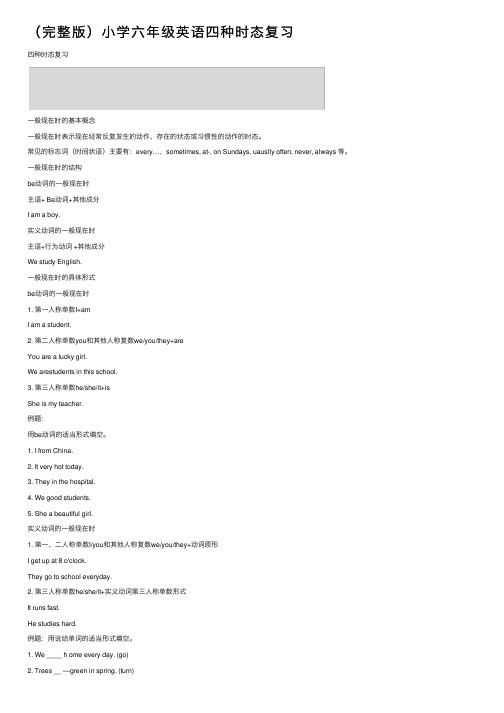
(完整版)⼩学六年级英语四种时态复习四种时态复习⼀般现在时的基本概念⼀般现在时表⽰现在经常反复发⽣的动作、存在的状态或习惯性的动作的时态。
常见的标志词(时间状语)主要有:every…,sometimes, at-, on Sundays, uauslly often, never, always 等。
⼀般现在时的结构be动词的⼀般现在时主语+ Be动词+其他成分I am a boy.实义动词的⼀般现在时主语+⾏为动词 +其他成分We study English.⼀般现在时的具体形式be动词的⼀般现在时1. 第⼀⼈称单数I+amI am a student.2. 第⼆⼈称单数you和其他⼈称复数we/you/they+areYou are a lucky girl.We arestudents in this school.3. 第三⼈称单数he/she/it+isShe is my teacher.例题:⽤be动词的适当形式填空。
1. I from China.2. It very hot today.3. They in the hospital.4. We good students.5. She a beautiful girl.实义动词的⼀般现在时1. 第⼀、⼆⼈称单数I/you和其他⼈称复数we/you/they+动词原形I get up at 8 o'clock.They go to school everyday.2. 第三⼈称单数he/she/it+实义动词第三⼈称单数形式It runs fast.He studies hard.例题:⽤说给单词的适当形式填空。
1. We ____ h ome every day. (go)2. Trees __ —green in spring. (turn)3. He ____ very hard. (study)4. The boy - ___ up at seven O'clock. (get)5. The earth ____ round the sun. (move)补充:主语为第三⼈称单数形式,谓语动词的变化规则:般现在时的句型变化 be 动词的⼀般现在时否定句主语 + be 动词 + not +其他He is not a worker.特殊疑问句特殊疑问词 + ⼀般疑问句Where is he?例题:写出下列句⼦中所缺的be 动词,并⽤肯定及否定形式回答。
四大时态复习(讲义)教科版(广州)英语六年级下册

小学英语四大时态复习教学目标:1. 掌握四大时态的结构和用法3. 以辅音字母+y结尾的单词,变y为i,再加es。
butterflybutterfliesfamilyfamilies4. 以o结尾的单词:有生命加stomatotomatoespotatopotatoes无生命加espianopianosphotophotoszoozoosradioradios时态专题综合训练一、单项选择1. John _____ football.A. likes playingB. likes playC. like play2. Does your mother _____ football?A. likeB. likesC. like play3. They usually _____ TV in the evening.A. watchB. will watchC. are watching4. —What do you usually do on the weekend?—I often ____.A. do my homeworkB. did my homeworkC. doing my homework5. I don’t like _____ thrillers(恐怖片)______ playing baseball.A. watching; orB. watching; andC. to watch; or6. Bob often _____ to school.A. walkB. walksC. walked7. My pen ______ on my desk ten minutes ago. But it _____ there now.A. is; isn’tB. was; isn’tC. is; is8. Mike is _____ after his classmates.A. runsB. runingC. running9. Be quiet! The babies ________.A. sleepB. are sleepingC. slept10.______ he _____ his homework yesterday?A. Does; doB. Did; didC. Did; do11. —What did you do last weekend.—I ______.A. go swimmingB. did my homeworkC. went swim12. —What’s your hobby?—_____ is my hobby.A. Collecting stampsB. Collect stampsC. Stamps13. —Where were you just now?—I _____ at school.A. isB. wasC. were14. ______ he ______ his grandparents last month?A. Did; visitedB. Did; visitC. Do; visited15. Last week, we _____ a _____ race.A. hard; runningB. have; runningC. had; running16. I______ to the park last week.A. goB. wentC. going17. If I _____ you tomorrow, I will give you the receipt(收据)。
小学四种时态试题及答案

小学四种时态试题及答案一、时态简介时态是指动词所表示的时间形式,用于表达动作或状态在时间上的关系。
在英语中,常见的时态有四种:一般现在时、一般过去时、一般将来时和现在进行时。
每种时态都有其特定的用法和标志词,下面将提供一些小学生常见的时态试题及答案。
二、一般现在时1. 完成句子:a) She ___________ (play) tennis every weekend.Answer: playsb) They ___________ (watch) a movie now.Answer: watchc) The cat ___________ (sleep) in the sun.Answer: sleeps2. 变为否定句:a) He watches TV every day.Answer: He doesn't watch TV every day.b) We eat ice cream in summer.Answer: We don't eat ice cream in summer.c) She plays the piano very well.Answer: She doesn't play the piano very well.三、一般过去时1. 完成句子:a) We ________ (visit) the museum yesterday. Answer: visitedb) He ________ (clean) his room last night. Answer: cleanedc) They ________ (watch) a movie last weekend. Answer: watched2. 变为否定句:a) She played soccer yesterday.Answer: She didn't play soccer yesterday.b) They went to the park this morning. Answer: They didn't go to the park this morning.c) He ate pizza for dinner.Answer: He didn't eat pizza for dinner.四、一般将来时1. 完成句子:a) I ________ (visit) my grandparents next week. Answer: will visitb) She ________ (buy) a new bike tomorrow. Answer: will buyc) They ________ (have) a party on Saturday. Answer: will have2. 变为否定句:a) They will come to the cinema with us. Answer: They won't come to the cinema with us.b) He will finish his homework later. Answer: He won't finish his homework later.c) We will go swimming this afternoon. Answer: We won't go swimming this afternoon.五、现在进行时1. 完成句子:a) They ________ (read) a book at the moment. Answer: are readingb) I ________ (play) soccer with my friends now. Answer: am playingc) She ________ (watch) TV in the living room.Answer: is watching2. 变为否定句:a) He is eating lunch now.Answer: He isn't eating lunch now.b) We are studying English at school.Answer: We aren't studying English at school.c) They are playing basketball in the park.Answer: They aren't playing basketball in the park.六、总结以上是关于小学四种时态的试题及答案。
小学英语六年级总复习四种十时态的结构和标志词语法讲解及基础练习
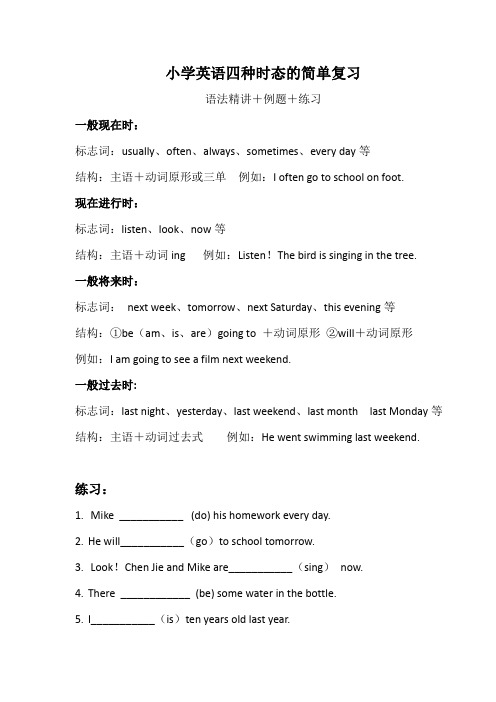
小学英语四种时态的简单复习语法精讲+例题+练习一般现在时:标志词:usually、often、always、sometimes、every day等结构:主语+动词原形或三单例如:I often go to school on foot.现在进行时:标志词:listen、look、now等结构:主语+动词ing 例如:Listen!The bird is singing in the tree.一般将来时:标志词:next week、tomorrow、next Saturday、this evening等结构:①be(am、is、are)going to +动词原形②will+动词原形例如:I am going to see a film next weekend.一般过去时:标志词:last night、yesterday、last weekend、last month last Monday等结构:主语+动词过去式例如:He went swimming last weekend.练习:1. Mike ___________ (do) his homework every day.2.He will___________(go)to school tomorrow.3. Look!Chen Jie and Mike are___________(sing)now.4.There ____________ (be) some water in the bottle.5.I___________(is)ten years old last year.6. We like ____________ (play) basketball after class.7.He___________(ride)a bike with his friend next week.8.My brother is___________(make)kites.9.They___________(do)their homework yesterday.10.We___________(take)a trip over the summer holiday.11. I like singing. I often ____________ (listen) to the music in the evening.12. My grandma ___________ (watch) TV every day.13.Mike didn’t___________(see)a film last night.14.What______you ______ ______ ______ (do)next Saturday.15.Is he___________(watch)TV ?Yes,they are.。
小学六年级英语四种时态综合练习
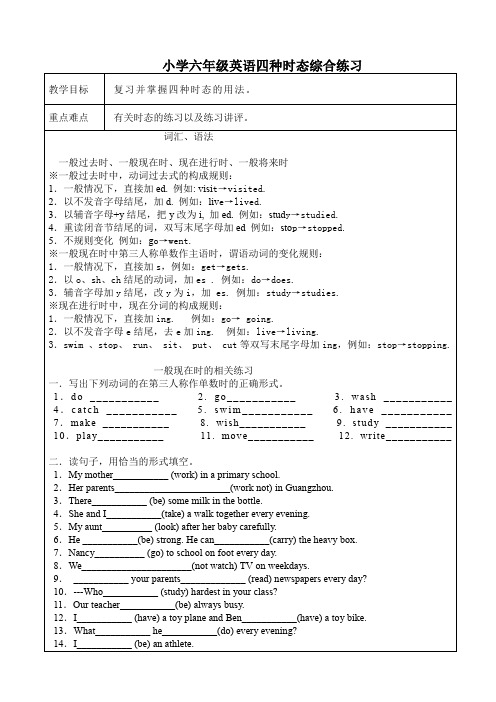
6.Look! The boy ______________________(swim ) with his friends in the pool. 7.She______________________(write) a letter now. 8.The reading room is quiet. Everybody ______________________( read ) books
market. 22.Ben___________ (like) cooking. 23.I always_______________ (finish) my homework before 8:00. 24.They___________ (have) a big house. 25.My father is a teacher. He___________(teach) English in a middle school. 26.Lucy_________ (do) not like English. 27.Who___________(cook) breakfast for you everyday? 三.按要求转换句子,每空一词。 1.Tom likes playing chess with his friends. (改成否定句)
homework. 三.按要求改写句子。
1.They are having an English class.(改为一般疑问句)
_________________________________________________________________ 2.My mother is cooking.(变成一般疑问句并且作肯定回答)
教学目标
小学六年级英语四种时态综合练习
小学英语 六年级四种时态总结复习过程
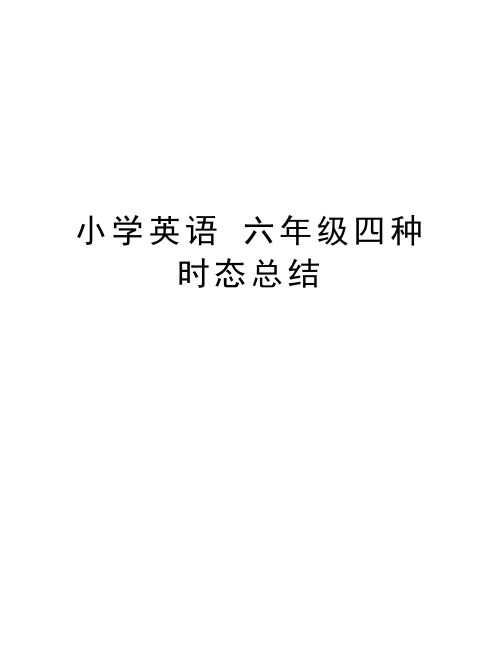
小学英语六年级四种时态总结小学英语四种时态总结1.一般现在时。
主要描述经常会发生的动作、状态或不变的真理。
句末常出现every day/week/year/Monday , in the morning, 句中常有always, usually, often, sometimes口诀:“经常有每没(美眉^^)总星周”经常:often有:sometimes (记住,“有”不是have,而是“有时”)每:every week/month/year 等没:never 总:always, usually等星周:on Mondays, on Tuesdays等组成:主语+be+名词(形容词)I am a student. He is tall.1. He is in New York with his cousin.他和他的堂兄在纽约。
2. These postcards are great.这些明信片真棒!3. It’s a picture of the Great Wall.这是一张关于长城的明信片。
4.I t’s more than twenty thousand kilometers long.它超过两万公里长5.It’s in the east of China.它在中国的东部。
6.There is a Chinatown in New York.纽约有一个唐人街。
7.There are lots of Chinese shops and restaurants there.那里有许多中国商店和餐馆。
8.There are lots of beautiful lakes in China.在中国有许多偏凉漂亮的湖泊。
9.It’s a big family dinner.它是一次大的家庭晚餐。
否定句:在be 后加notI am not a student. He is not tall.1.2.3.4.5.6.7.8.9.疑问句:be 动词提前到第一位。
- 1、下载文档前请自行甄别文档内容的完整性,平台不提供额外的编辑、内容补充、找答案等附加服务。
- 2、"仅部分预览"的文档,不可在线预览部分如存在完整性等问题,可反馈申请退款(可完整预览的文档不适用该条件!)。
- 3、如文档侵犯您的权益,请联系客服反馈,我们会尽快为您处理(人工客服工作时间:9:00-18:30)。
小学英语四种时态复习一提到时态,就必然用到动词。
首先要明确两个概念:动词有五种形式,即:原形(形式),第三人称单数(形式),过去式(形式),现在分词(形式),过去分词(形式)。
小学阶段,句子有以下四种常见时态,即:一般现在时态;一般过去时态;一般将来时态;现在进行时态。
式,意思就是各种不同的形式,是对应着动词来说的;时态,意思就是表达各种不同的时间的事情,是对应着句子来说的。
式与时,先搞懂区别。
一、一般现在时态一般现在时用法口诀一般现在时,every, usually, often, sometimes.第一、二人称和复数,动词原形不变换。
除了I, you,复数外,动词后加s(es)别忘怀。
要变一般疑问句,be动词提前很容易。
若是没有be动词,Do和Does开头要注意。
否定句,很简单,not 在be 动词后面站。
若是没有be动词,do, does加not 要牢记。
请把这些规律记,一般现在时没问题。
一般现在时态,可能是两种意思。
第一,表示经常性的动作,常与often, sometimes, usually, every day, everyweek, every month, every year等表示频率的副词连用。
例如:He often goes swimming in summer.I usually go to work by bike.Sam visits China every year.第二,表示现在的状态。
如:My mother is a worker.There is a computer in our classroom.注意问题:be (am, is, are) 动词就是独立的谓语动词,一个句子中有了be(am, is, are) 就有了谓语动词了。
句子中不能同时出现两个谓语动词。
不少同学经常出这样的错误:The boy is often eats hamburgers.(错)应改为: The boy often eats hamburgers.二、现在进行时态正在进行时态口诀现在分词用途多,进行时态不用说。
它的构成很好记,动词后缀ing。
词尾若有哑音e,去e再加没问题。
一辅重读闭音节,这个字母要双写。
还有一点要注意,改y为i再加ing。
现在进行时态,表示现在正在发生的动作。
结构是:am/is/are + 动词ing(现在分词)形式。
如:I’m writing a story.You/They/We are cleaning the classroom.He/She/It is having some food.三、一般将来时态一般将来时态用法一般将来时,将要发生事。
谓语不一般,will后加动原。
要变疑问句,will置主语前。
否定句,也不难,will后把not添。
一般将来时态,表示将要发生的事情。
结构是:am/is/are going to + 动词原形;或者是will + 动词原形。
will 通用于各种人称之后,不受人称和单/复数变化的影响。
如:I/We/You/You/He/She/It/They will take a walk after supper.I am/ We are/They are/ You are/ He/She/It is going to have a walk after supper.四、一般过去时态一般过去式之歌过去式构成有方法,一般词尾加ed。
如果词尾有个e,直接加d就可以。
辅音字母y在尾,改y为i加ed。
“一辅重闭”作尾巴,双写之后ed加。
标准过去式加ed,少量不规则分别记。
am和is对was,are要变were没问题。
have和has用had,do和does变did。
动词过去式不规则词(目前学过的):am—was is—was are—weredo—did does—did have—had has—hadgo—went buy—bought一般过去时态,也有两种意思。
第一,表示过去发生的动作,经常与明确的表示过去的时间连用,如:last week, yesterday, the day before yesterday,last night, last year, last weekend 等。
如:The family had a picnic in the park last weekend.第二,表示过去的状态。
如:There was a small pond in the school before.Mary was a teacher two years ago.注意问题:be (was, were) 是独立的谓语动词,它不能与行为动词的过去式同时使用。
同学们经常出这样的错误:It was rained yesterday. (错)应改为; It rained yesterday.The ducks were ate our picnic. (错)应改为:The ducks ate our picnic.过去式动词不存在第三人称单数的问题。
也就是说,一般过去时态的句子中,无论主语是什么人称,单数还是复数,过去式动词都不能加s/es.专项练习一、用动词的正确形式填空1. I ________ (do) my homework every evening.2. We _______ (fly) kites in the park on Sundays.3. My mother ________ (clean) our room on Sundays.4. Tom _______(play) the piano every Saturday. Now he______ (play).5. She _______(like) swimming. She ______ (swim) this weekend.6. Usually my mother _______ (wash) the dishes after lunch. But my grandma_______ (wash) today.7. Look at the man! He ______ (read) a magazine.8. Look! The plane ________ (fly) over the building.9. Listen! My aunt ________ (sing) in the room.She is a singer. She _____ (like) singing. She_______(have) a music show. She is excited.10. Tom and Mike always ______ (swim) in the river. They _____ (swim) in the swimming pool this Sunday. Look! They ______ (swim).11. What ______ you usually ______ (do) in the evening?I _______ (play) computer games.12. What _______ you _______ (do) now?I _______ (make) a paper plane.13. What _______ he _______ (do)?He ______ (dance).14. What _______ she ______ (do) yesterday?She ______ (visit) her grandparents.15. ______ your mother ______ (read) newspaper in the morning?Yes, She ________ .16. _______ you _______ (like) fishing?No, I ______ . I like ______ (swim),but my brother ______ (like).17. How ______ your father _______ (go) to work every day?He ______ (go) by bike. But it’s cold today. He ______ (take) the No.21 bus,, and he _______ (go) to work by taxi yesterday.18. _______ the monkey _______ (like) climbing trees? Yes, it _______ .19. What _______ your father ______ (do) after lunch? He _______ (read) a comic book. What_____ he _______(do) today? He _______ (clean) the kitchen for my grandma. Look!He (clean).20. ________ you ______ (collect) stamps? Yes. I _______ .________ your brother ______ (collect), too? No, he ________ .二、选择题1. _____ he _____ to the park at 6:30 in the morning? No,he _____ .A. Does; goes; doesB. Does; go; doesn’tC. Does; go; does2. What colour _____ you _____ this bookcase? I _____ it pink.A. are; going to paint; am going to paintB. do; paint; paintC. did; paint; painted3. Tim always _____ a picture at home. He _____ a car now.A. draws; is drawingB. draw; drawC. draws; draw4. She usually _____ her friends. They often _____ tea.A. see; drinkB. sees; drinksC. sees; drink5. He usually _____ the dishes at night, but tonight he _____ clothes.A. wash; washB.washes; is going to washC. is washing; washes6. Mr. Green usually _____ his newspaper in the evening, but he and his wife _____ television yesterday evening.A.reads; watchesB.reads; is going to watchC.reads; watched7. Where are the man and the woman? They _____ near the tree.A. sitB. satC. are sitting8. _____ your penpal _____ diving? No, he _____ .He ______ writing stories.A. Does; like; doesn’t; likesB. Does; likes; doesn’t; likeC. Do; like; don’t; likes9. _____ you _____ fishing yesterday? No, we _____ .A. Does; go; doesn’tB. Did; go; didn’tC. Do; go; don’t10. Open the window, Please. Look! He _____ it.A. opensB. is openningC. is opening11. I usually _____ some milk every day. But I _____ coffee yesterday.A. drink; drankB. is drinking; drinkC. drank; am drinking12. Mr. Green often _____ his newspapers at night. But he _____ an interesting book tonight.A. reads; readsB. reads; readC. reads; is going to read13. The old man _____ playing sports in the park. He _____ morning exercise now.A. likes; is doingB. likes; doesC. like; doing14. What _____ you usually _____ in the evening? I ______ computer games.What _____ you _____ last night? I _____ a book.A. do; do; playB. did; do; playedC. does; do; playsdid; do; read do; do; read do; do; am reading15. Where ______ the boy _____ ? He _____ across the river now.A. does; swim; swimsB. is; swimming; is swimmingD. is; swimming; is swimming16. _____ you _____ to music now? Yes, we _____ .A. Do; listen; doB. Did; listen; didC. Are; listening; are17. Put on you coat, please. OK. I ______ it on.A. am puttingB. am going to putC. put18. _____ you ______ coffee? Yes, I ______ .A. Do; like; doB. Did; like; didC. Are; like; am19. Look! Two cats ______ across the wall.A. runB. runsC. are running20. She _____ tea, but he _____ .A. likes; doesn’t B; like; don’t C. like; doesn’t。
